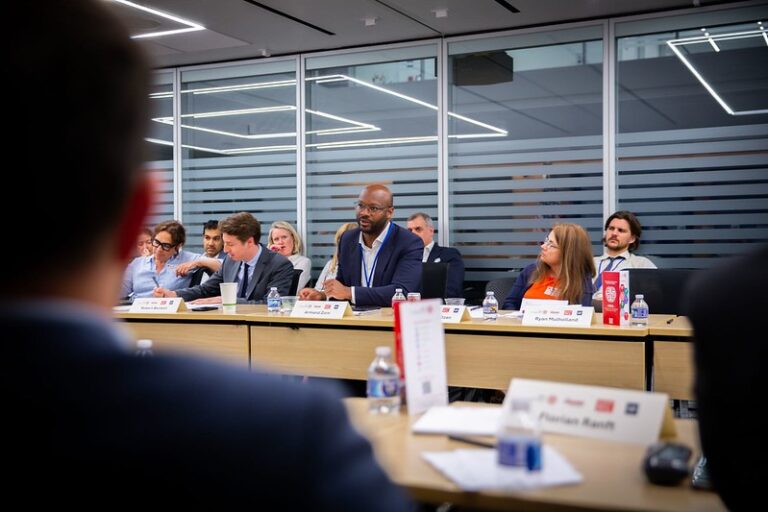A delegation of trade unionists from the United States visited Das Progressive Zentrum for a roundtable encouraging the transatlantic dialogue and cooperation on a just transition.
A group of trade unionists from the United States came to Germany for a week of exchange on a just transition. Das Progressive Zentrum invited them to discuss issues regarding the coal exit in Germany and the United States from a civil society perspective. The delegation trip was funded on behalf of the Federal Ministry for the Environment and was carried out by the Ecologic Institute US in cooperation with IFOK. You can find the key elements of the discussion summarized below.
The energy sector in transition
Both in the United States and Germany, energy sectors are in transition. While the transition in the US is driven primarily by market forces, the process in Germany is more a result of public policy. However, the consequences of climate change in terms of economic, social and environmental impacts are the same. This challenge creates an opportunity for transatlantic dialogue on how best practices and relevant processes can further a just transition. A just transition must create broad economic opportunities for all at the regional and macro-level. It needs to address individual challenges of the transformations such as professional training and the offsetting of environmental impacts. Unfortunately, achieving such a just transition multilaterally has become much harder in recent years.
The challenges facing multilateralism
The unsuccessful 2019 UN Climate Change Conference in Madrid continued the trend of aggravating climate diplomacy and international cooperation, which started with the US-withdrawal from the Paris Climate Agreement. Vulnerable international agreements are obstructed by countries pursuing narrow national interests. Further evidence for this unreliability was the recent attempt by the Trump administration to buy exclusive rights to the coronavirus vaccine. Such unilateral actions undermine attempts of necessary international solidarity during global crises such as the climate crisis or the corona-pandemic. It is clear that the Trump administration – once again – is turning out not to be a trustworthy partner in tackling these supranational challenges for humanity. Even more discouraging is how the current transatlantic rhetoric is tainted by distrust, fragmentation and even hostility. This is shown for instance by calling the EU a foe, encouraging the disintegration of the EU (Brexit), supporting anti-democratic leaders in Europe (Poland, Hungary) and simply rude language via Twitter-diplomacy – leaving very little space for any fruitful dialogue at all.
On the other hand, productive and encouraging initiatives like Fridays for Future, the Powering Past Coal Alliance or the US Climate Alliance have grown simultaneously. Not only in a bottom-up manner but also by coordinating across national boundaries. In doing so, they embrace new alliances to go beyond the conventional approaches of diplomacy. These developments provide alternative and necessary paths towards achieving a just transition and decarbonisation.
Barriers to fruitful international dialogue
Trade
The ongoing trade conflict between the world’s two largest national economies, China and the United States, is affecting the global economy. And in light of the global recession caused by the corona-pandemic, each one is trying to influence global power structures to their benefit. The use of protectionism as proclaimed self-defense measures has increased pressure on European industries to be more innovative while being less pollutive. One recent example is the United States threatening to levy huge tariffs on European cars. However, it is not a one-way street. Agricultural policies and interests in the EU have long been a barrier for reaching a holistic trade agreement between the two continents. And while the European carbon pricing mechanism is slowly promoting the decarbonisation in the energy and industry sector, international differences in climate policies may imply competitive disadvantages. In the context of the European Green Deal border carbon adjustments are a very promising tool. But their compatibility with rules of the WTO requires further discussion. Here, a coordinated approach by the USA, the EU and China could bring new dynamism to international trade and climate negotiations.
Energy and Climate
The human-made climate crisis demands an international response as climate action is required across all countries and sectors. However, vast sums of money are driving the conventional energy industries. This slows or even prevents the launch of a meaningful energy transition. Furthermore, structural-change processes in industrial regions are characterized by lock-in effects that lead to delays and blockades, as coal industries often have great regional economic importance. “Not infrequently, structural change has been held back by affected companies, employees or politicians”, making it harder for governments on the international level to come up with ambitious carbon-reduction-plans.
Security
New technologies and critical infrastructures are often in the hands of tech giants. Regulation lags behind both in digital literacy and in developing new security measures. The changing nature of security threats – cyber-attacks, digital warfare, election interference – calls for new holistic policies to be developed internationally. Instead, the lack of exchange and dialogue hinders meaningful action. While the US increasingly seems to rely on unilateral action, ideas such as European strategic autonomy or sovereignty grow. They are aimed at strengthening the ability to set priorities and make decisions in matters of foreign and security policy. In addition to that, they are broadening the capacity to play a role in shaping global affairs and are setting new tones in the security discourse. The ongoing conflict within NATO over spending deficits is one expression of this perceived weakness. Another is the debate on the Nord Stream 2 pipeline, which is not only revealing inner-European tensions with regard to energy security but is also severely impacting transatlantic relations.
Time to stop the demolition of the US-EU relations.
Despite all these challenges, the US and Europe are allies at many levels. Both share crucial strategic interests in addition to a mutual set of values. As transatlantic alliances are challenged multilaterally, other levels must maintain the bonds which serve common interests. This calls for states, cities, businesses, unions, scientists and citizens, to foster a multi-level transatlantic exchange on the many issues involved. Getting together to build a just transition can offer a new avenue for rejuvenating an honest transatlantic dialogue.
If you want to find out more about how Foreign Policy and a just transition are linked, have a look at our project and the Policy Brief.
The delegation trip was carried out by the Ecologic Institute US in cooperation with IFOK and was funded on behalf of the Federal Ministry for the Environment.









